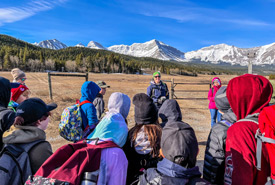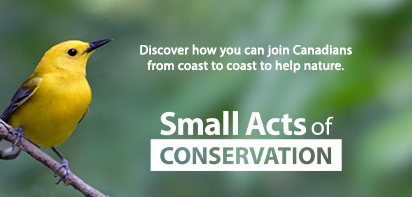Schools of thought amid flocks of birds and herds of elk

Emilie Brien talks to a group of students at NCC's Fleming Ranch (Photo by Derek Shackleford)
Nature is a powerful teacher, so why not make the great outdoors a classroom?
That’s the thinking of Emilie Brien, the Nature Conservancy of Canada’s (NCC’s) natural area manager for the Castle-Crowsnest Watershed, who, since last fall, has been leading outings with elementary and high school students from Crowsnest Pass and Pincher Creek to help them learn about science and nature.
Students lead the way
Emilie says she offers students a “choose your own adventure” approach to these days in the field.
“I make sure these events are not like the regular classroom, so I never have a strict program of what I’m going to do,” she says.
Emilie starts each outing with a shortlist of topics related to the surrounding landscape, then lets the students decide which direction to go. After first letting the students expend some energy running around, she presents them with thought-provoking questions about the surrounding ecosystems, plants and wildlife.
“I like make sure it’s fun, and I focus on what seems to interests the students,” she says. “I try to take a very broad approach, and just share my passion with what they seem to be interested in.”
Emilie has held these outings at both local greenspaces and nearby NCC properties.
“These are very rich environments, and we don’t have to drive 12 hours and hike for days to get there,” she said. “It’s super valuable to have that in our backyard and experience nature, without really leaving the community.”
Following trails and paths of conversations
On the latest venture, she took two groups of Grade six students from Pincher Creek to NCC’s Fleming Ranch to discuss the local plants and animals found here as well as approaches to conservation.
One of the more energetic discussions focused on wildlife tracking, including the identification of mammal scat, more colloquially known as poop.
“I asked if anyone could find moose poop, because we had been seeing lots of elk poop, and when they found it, they were super proud,” says Emilie. “Some people might think it’s silly to be so excited about poop, but seeing the kids passionate and interested about that knowledge is great, because I’m passionate about it, too."
While mobile phones in the classroom get a bad rap, the students were eager to use their devices in the field to help them learn.
“They were still in the moment and using their cell phones as a tool to identify species and navigate — that was really cool to see,” she says.
That event followed one where with high school students from Crowsnest Pass at another NCC property, Bohomolec Ranch, where Emilie discussed her on-the-ground work with NCC in more detail.
“I focused on my specific duties a bit more, because at that age, they’re starting to think about a career a little bit,” she says.
Inspiring tomorrow's conservation leaders
While Emilie says leading these learning expeditions are a bit outside the core duties of her role, she thinks they can be an important tool to further conservation efforts in the area — both now and into the future.
“People are not going to want to protect something they don’t know or care about,” she says. “I want them to know what’s out there in their backyard, and I want them to know why it’s precious and important. If the kids of today don’t take over after we’re gone, whatever we do now is for nothing.”
If you would like to help secure these living classrooms for generations to come, considering donating to NCC.
Emilie thanks teachers Derek Shackleford, Matt Hennig and Dakota Kuftinof for helping arrange the outings.




